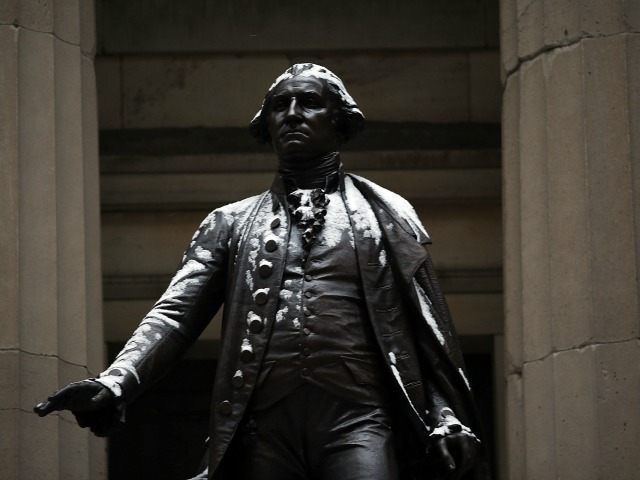On the third Monday of February, Americans celebrate George Washington’s Birthday, often inappropriately called “Presidents Day.” Even more unfortunately, this holiday doesn’t even fall on Washington’s Birthday due to the Uniform Monday Holiday Bill, which pushed numerous holidays to Monday in order to create more three-day weekends. Washington’s real birthday does not occur until February 22.
The sad result of the attempt to create more long weekends is this uninspiring, mishmash holiday that falls between Washington’s Birthday and Lincoln’s on February 12, and ends up being barely more than a bland, generic February day off to clean house. This is a shame; the Father of Our Country deserves better.
David Azerrad of the Heritage Foundation justly called the holiday “insipid,” and lamented the fact that a celebration of Washington was lumped in with a menagerie of other second-rate presidents. “Washington, the ‘indispensable man’ of the revolution who was rightly extolled for being ‘first in war, first in peace, and first in the hearts of his countrymen,’ has now been lumped together with the likes of James Buchanan, Jimmy Carter, Franklin Pierce and John Tyler,” he said.
It is particularly unfortunate that there is not a more proper celebration of Washington in 2016, as the United States gears up to choose its next president and commander-in-chief of the armed forces. George Washington set a precedent of presidential leadership and dedication to Constitution.
Washington came into office as a great man: the hero of the American Revolution, a great warrior, general, and leader who had also made himself wealthy through hard work and shrewd business practices at his Mount Vernon plantation. Having already willingly resigned his commission to the Continental Congress at the end of the Revolutionary War, he ended any discussion of military dictatorship for the new country. Washington was aiming for something much higher than being simply one of history’s great commanders and conquerers.
What made Washington truly great is that he eschewed “great man” politics. Though the story of the American Revolution can largely be told through Washington’s life, he believed that the ideas and the constitutional government that were produced by it were far larger than himself.
In 1776, John Adams wrote, “There is no good government but what is republican…[T]he true idea of a republic is ‘an empire of laws, and not of men.’ That, as a republic is the best of governments, so that particular arrangement of the powers of society, or in other words, that form of government which is best contrived to secure an impartial and exact execution of the law, is the best of republics.”
This is what Washington, Adams, and the Founding Fathers fought for and dedicated their lives to. They were creating a republic based around the idea of ordered liberty. Washington was undoubtedly a great man, but knew that to establish a grand republic to survive the ages the new country would have to thrive without the perpetual need for “great men” wielding unlimited power in high office.
The historian and political philosopher Harry Jaffa wrote in his book, A New Birth of Freedom:
America’s Founding Fathers denied entirely any right of “Caesar”… Caesarism, which became the ultimate origin of the divine right of kings, was accordingly anathema to Americans. The American Founders looked toward and empire of freedom unprecedented in human history. They meant to combine power greater than that of the Rome of the Caesars with freedom greater than that of the roman republic or any other republic of antiquity.
When constitutional crisis emerged, such as in the National Bank debate authorization conflict, Washington did not simply mock the idea of following the founding document as some modern politicians have. Washington consulted the greatest legal minds of his generation and settled on policy he believed was in the scope of the the Constitution’s original intention.
It was this adherence to ideas and the rule of law that separated Washington from a Napoleon Buonaparte—another great man who helped topple the French Monarchy to established a republic, but eventually drove his nation to an empire of arbitrary rule. And it was the commitment to the Constitution and ultimately the virtue of the American people that allowed America’s founding generation to create an empire of liberty. Washington understood this when he become the first president of the United States. He said in his inaugural address, “The sacred fire of liberty and destiny of the republican model of government are justly considered, perhaps, as deeply, as finally, staked on the experiment entrusted to the hands of the American people.”
The great historian of the founding, Forrest McDonald, summarized the importance of Washington in his book The Presidency of George Washington.
“George Washington was indispensable, but only for what he was, not for what he did,” McDonald continued. “He was the symbol of the presidency, the epitome of propriety in government, the means by which Americans accommodated the change from monarchy to republicanism, and the instrument by which an inconsequential people took its first steps to becoming a great nation.”
It should be particularly apparent in the minds of Americans today—after the passing of the great “Originalist” Supreme Court Justice Antonin Scalia—how fragile American liberty is. This country as it was founded will not survive if leaders do not commit to circumscribed governmental power. It will be even worse if the people no longer care to hold them accountable and in check.
This makes the celebration of Washington’s life so important at this time. Americans honor the Father of Our Country by committing to the principles and ideas he stood for and exemplified in office. It is the only way to keep our republic.

COMMENTS
Please let us know if you're having issues with commenting.